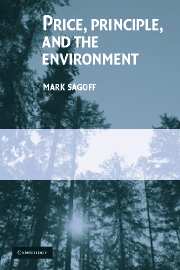Book contents
- Frontmatter
- Contents
- Acknowledgments
- 1 Zuckerman's Dilemma: An Introduction
- 2 At the Monument to General Meade or On the Difference between Beliefs and Benefits
- 3 Should Preferences Count?
- 4 Value in Use and in Exchange or What Does Willingness to Pay Measure?
- 5 The Philosophical Common Sense of Pollution
- 6 On the Value of Wild Ecosystems
- 7 Carrying Capacity and Ecological Economics
- 8 Cows Are Better Than Condos or How Economists Help Solve Environmental Problems
- 9 The View from Quincy Library or Civic Engagement in Environmental Problem Solving
- Notes
- Index
1 - Zuckerman's Dilemma: An Introduction
Published online by Cambridge University Press: 15 December 2009
- Frontmatter
- Contents
- Acknowledgments
- 1 Zuckerman's Dilemma: An Introduction
- 2 At the Monument to General Meade or On the Difference between Beliefs and Benefits
- 3 Should Preferences Count?
- 4 Value in Use and in Exchange or What Does Willingness to Pay Measure?
- 5 The Philosophical Common Sense of Pollution
- 6 On the Value of Wild Ecosystems
- 7 Carrying Capacity and Ecological Economics
- 8 Cows Are Better Than Condos or How Economists Help Solve Environmental Problems
- 9 The View from Quincy Library or Civic Engagement in Environmental Problem Solving
- Notes
- Index
Summary
Many of us recall from childhood – or from reading to our own children – E. B. White's story of the spider Charlotte and her campaign to save Wilbur, a barnyard pig. Charlotte wove webs above Wilbur's sty proclaiming the pig's virtues in words – “terrific,” “radiant,” and “humble” – she copied from newspaper advertisements salvaged by a rat named Templeton. Wilbur, Charlotte wrote in her web, was “some pig.” He won a prize at the fair. Moved by these events, Zuckerman, the farmer who owned Wilbur, did not slaughter the pig for Christmas dinner. Charlotte saved Wilbur's life.
“Why did you do all this for me?” the pig asks at the end of Charlotte's Web. “I don't deserve it. I've never done anything for you.”
“You have been my friend,” Charlotte replied. “That in itself is a tremendous thing. I wove my webs for you because I liked you. After all, what's a life, anyway? We're born, we live a little while, we die. A spider's life can't help being something of a mess, what with all this trapping and eating flies. By helping you, perhaps I was trying to lift up my life a little. Heaven knows, anyone's life can stand a little of that.”
Three Kinds of Judgments
In the following chapters, I want to call attention to a distinction between three kinds of judgments. First, we make judgments as individuals about what is good for or benefits us.
- Type
- Chapter
- Information
- Price, Principle, and the Environment , pp. 1 - 28Publisher: Cambridge University PressPrint publication year: 2004



